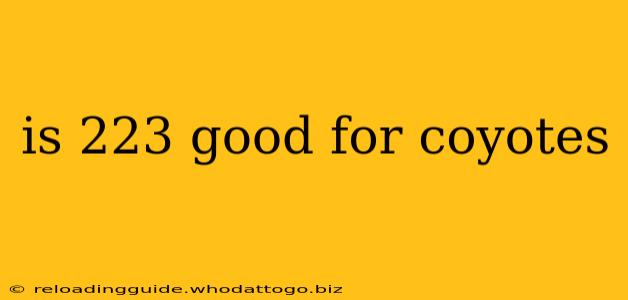Is 223 Good for Coyotes? A Comprehensive Look at Caliber Effectiveness
The question of whether a .223 Remington is good for coyotes is a common one among hunters and landowners dealing with coyote populations. The answer, however, isn't a simple yes or no. The effectiveness of the .223 for coyote hunting depends on several crucial factors, including shot placement, bullet selection, and the range of the shot.
Understanding the .223 Remington:
The .223 Remington is a relatively lightweight, high-velocity round initially designed for military applications. Its popularity stems from its relatively low recoil, manageable cost, and decent accuracy at moderate ranges. However, its suitability for coyote hunting requires careful consideration.
Factors Affecting Effectiveness:
-
Bullet Selection: This is paramount. While a standard full metal jacket (FMJ) .223 round might be adequate for varmints at close range, its limited expansion can prove insufficient for coyotes, particularly larger ones. For ethical and effective coyote hunting, expanding bullets, such as bonded soft points or controlled expansion designs, are strongly recommended. These bullets transfer more energy upon impact, increasing the likelihood of a quick, clean kill.
-
Shot Placement: As with any hunting caliber, precise shot placement is critical for a humane kill. A poorly placed shot, even with a potent bullet, can lead to a wounded and suffering animal. Aiming for the vital areas, such as the brain, heart, or lungs, is essential.
-
Range: The effective range of a .223 for coyotes is limited compared to larger calibers. Beyond 200-250 yards, the trajectory and energy drop-off can significantly reduce the round's effectiveness. Accuracy also diminishes at longer ranges. Accurate shots at longer ranges require proficiency in both marksmanship and ballistic calculations.
-
Coyote Size and Weight: Coyotes vary in size and weight, and larger animals naturally require more stopping power. A smaller coyote might be dispatched effectively with a well-placed .223 shot, but larger, heavier coyotes could prove more resilient.
Alternatives to Consider:
While the .223 can be effective, some hunters prefer larger calibers such as the .22-250 Remington, .204 Ruger, or even the venerable .223 WSSM for their increased energy and range, particularly when hunting larger or more distant coyotes. These cartridges deliver more stopping power, leading to cleaner kills and reducing the risk of wounding.
Conclusion:
In conclusion, the .223 Remington can be effective for coyote hunting, but only under specific conditions. The use of appropriate expanding ammunition, precise shot placement, and hunting within a reasonable range are all absolutely critical for ethical and successful coyote control. Hunters should carefully weigh the limitations of the .223 against their hunting style and the size and range of their target coyotes. If you are unsure, seeking advice from experienced hunters or a firearms professional is recommended. Always prioritize ethical hunting practices and responsible gun ownership.

